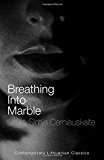 Source: Free review copy received from publisher
Source: Free review copy received from publisher
Translated from the Lithuanian by
Winner of 2009 EU Prize for Literature
Five words from the blurb: adopt, troubled, trauma, unsettles, family
Breathing Into Marble is probably the first Lithuanian book to be translated into English, and it is for this reason that I agreed to accept a review copy from its publishers, Noir Press.
The book follows Isabel as she adopts Ilya, a boy with a troubled past. The way he disrupts life in his new family is beautifully described, skillfully showing how trauma from past events affects people as they try to proceed with their lives.
The problem was that I was too aware of the writing. Brilliant prose flows so well that you barely notice it, but the writing in this book was strangely jarring. There was an overuse of metaphor that often made me cringe, in what would otherwise be a great paragraph:
The sky above the woods shone like a pearl, a reproach to the heavy darkness of the earth. The painfully empty space attracted her. At night, half sleeping in bed, as heavy as a bag of gravel, her body would grow lighter and soon Isabel would feel that if she just rid herself of one last small stone she would rise up into the air.
In copying out the above passage I realised that it was quite beautiful in isolation. The problem was that there were so many metaphors throughout the book that I quickly became irritated by them.
I also found reading the book to be hard work. So much of what happens isn’t described explicitly – the reader has to deduce it by reading between the lines. This meant I sometimes missed important events and, confused, had to back-track to see where I had failed to spot the action.
The above criticism makes it sound as though I didn’t enjoy the book, but this isn’t strictly true – I appreciated its literary quality, and the emotion of individual scenes, but found it wasn’t compelling as a whole. I’m pleased I read it – particularly as it’s the first Lithuanian book I’ve tried, but I prefer reading to be less hard work.
If you enjoy literary fiction that works the mind, then you’ll find a lot to like in this book. It is beautifully observed and captures many profound moments in the relationship between family members.

.
